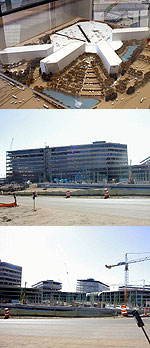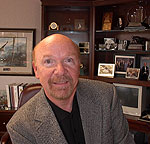By Mark Zdechlik
Minnesota Public Radio
April 1, 2002
This week, Minnesota-based Best Buy Co. is expected to report record breaking profit for its past fiscal year which ended last month. Best Buy is the nation's largest consumer electronics retailer. Despite the difficult economic conditions, Best Buy's stock has surged over the past year.
Wall Street analysts predict even better times ahead for the company, thanks in no small part to recent acquisitions that are opening new markets.
| |
|
|
|
||
In a small room just off the main entrance to Best Buy's crowded primary headquarters in suburban Minneapolis, there's a large table top model of the company's new corporate campus under construction along Interstate 494 in Richfield.
Della Kolpin has worked for more than three years on the $160 million project. It will bring together Best Buy's roughly 5,000 corporate workers who are currently scattered throughout a dozen locations in Eden Prairie.
"We're building about 1.6 million square feet," says Kolpin. "It's really comprised of four office towers, the parking structure, and then the hub as we call it - it's the interconnecting common space...between the four office towers."
In stark contrast to many companies which have been forced to pull back expansion plans, and otherwise slash costs in an uncertain economy, Best Buy is charging ahead.
The company's latest fiscal year's sales surged 28 percent over the previous year, to more than $19.5 billion. Best Buy shareholders have become accustomed to recent annual earnings growth in of more than 30 percent.
Founder and CEO Richard Schulze, who's set to step down from the job in June, says investors can expect Best Buy to sustain its current level of growth.
"Our team believes we can," says Schulze. "It's exciting for me to see so many of our leaders stepping up with very aggressive, very confident ideas on how we pursue the retail marketplace that's open to us here - plus emerging elsewhere."
Best Buy built its success as the nation's No. 1 electronics retailer on big-box stores boasting the latest merchandise and competitive prices. Best Buy currently has more than 400 retail stores. The company has opened about 60 new stores per year, and expects to reach market saturation in the U.S. with 550 stores in 2004.
| |
|
|
|
||
To continue growing, Best Buy is moving beyond its successful big-box format, and looking outside the United States for expansion.
Domestically, Best Buy extended its reach through the acquisition of Musicland, which held primarily mall-based stores including Sam Goody and Suncoast. Since completing that purchase early in 2001, Best Buy has added hardware like digital telephones, cameras and MP3 players to the lineup of music and videos traditionally sold in mall stores.
Schulze says the move into malls has opened up an entirely new market.
"Once we have a chance to position the brand effectively, and find the right combination of hardware with the software, that it'll be a pretty exciting format to a totally differentiated customer base," says Schulze. "Sam Goody and Sun Coast and the like - primarily operating from within malls - deal more traditionally with the female customer...typically more in that 18-to-35 year-old age range."
Schulze says Best Buy also plans to use relatively small mall-format stores to extend it reach into rural markets.
"The Musicland acquisition was somewhat of a risk last year," says industry analyst Alan Rifkin of Lehman Brothers.
Rifkin calls Schulze a visionary who, when faced with market saturation with its traditional stores, identified the Musicland acquisition as a strategic move. That move has already begun paying off.
"Despite the fact that the company really had no significant exposure to mall-based smaller formats before the Musicland acquisition...through the remerchandising and remodeling effort at the Sam Goody stores in particular, they have improved the operations there," says Rifkin.
Best Buy's international plans led to the acquisition of Canada's biggest electronics retailer, Future Shop, last year. Schulze says the move north will likely serve as a springboard for growth into European markets.
"It's not unlike the U.S. 10 years ago. Highly fragmented. Wide variety of small mom-and-pop type stores all over in many of the countries that are there," says Schulze. "With their financial decision to move to the Euro...we certainly think that Europe probably is one of the safest places to begin our strategy away from North America."
Schulze says Best Buy is also looking toward markets in Australia and Asia.
Forbes magazine recently named Best Buy the No. 1 company in the United States. The price of Best Buy stock skyrocketed more than 70 percent during its last fiscal year, which ended earlier March 2, 2002.
Most Wall Street analysts remain bullish on Best Buy. Alan Rifkin of Lehman Brothers recommends investors sell stock in archrival Circuit City, in favor of Best Buy.
Still Rifkin says Circuit City, however badly beaten down now, remains somewhat of a threat. "In Circuit City - for lack of better words - you have a wounded animal, and a wounded animal is always somewhat unpredictable."
Rifkin says Circuit City could attempt to lure back lost business by slashing prices. Less than two years ago, a downturn in personal computer sales and price wars cut into Best Buy's bottom line.
But Schulze says he thinks battles with Circuit City are largely behind Best Buy now.
"We have the lowest operating cost of any of the retailers in this industry. When it comes to waging any kind of war based on price, we're in the most favored position," says Schulze. "So anybody who believes they can actually under-price us will obviously suffer greater financial pain than we will."
Not long ago, specialty digital products - telephones, cameras, DVD players - were sold mainly at electronics stores like Best Buy. But now they're widely available at general merchandise discounters like Walmart and Target. Schulze acknowledges that's cutting into sales. But he's confident Best Buy will continue to draw customers by offering the newest products, and having the technological expertise many consumers are looking for.
Industry analyst Marie Driscoll of Argus Research agrees. Driscoll says Best Buy's close ties with manufacturers give the company an important advantage over general merchandise stores.
"There will be new products in the pipeline, and you can be sure that Best Buy will be one of the first to have them," says Driscoll.
Although widely credited as the driving force behind Best Buy, Schulze promises to remain involved in strategic planning as Best Buy's chairman of the board.
His hand-picked successor, Brad Anderson, has been working at Schulze's side for nearly 30 years. For those two reasons, Wall Street has not panicked at the leadership change.
In addition to strategic planning, Schulze says he'll be working to groom future company leaders.
Construction of Best Buy's new corporate campus along Interestate 494 in Richfield is slated for completion late this year.
More Information

